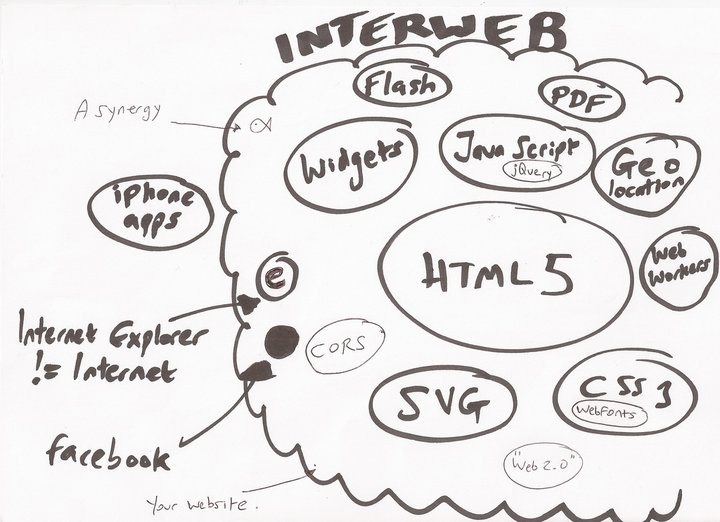W3C warns: HTML 5 for experiments only!
Despite the buzz around HTML 5, the specifications are not yet ready for use due to compatibility issues. This is the official position of the W3C consortium, which Philippe Le Hégaret, head of the W3C Interaction Domain, said in an interview with InfoWorld a week ago. This group develops technologies for user interfaces: (X) HTML, CSS, MathML, SMIL, SVG, XForms.
“Right now HTML 5 is at different stages of implementation in various web browsers. If you look at them, you can see that the most aggressive implementations are in beta versions, ”said Le Egart. - IE9, for example, is not planned for final release until the middle of next year. This is the moment when most businesses will start switching to a new generation of browsers. ”
At the same time, Le Egare agreed that HTML 5 is a “revolutionary technology” (game changer), so he suggests that companies make new-generation web applications on internal networks where they can control rendering engines. In the open web, it is not yet possible to develop, but only to experiment.
Le Aghare said a few words about Flash technology. Although some market players see HTML 5 as a replacement for Flash, in the coming years we will not be able to refuse it. It takes a long time for all web clients to start supporting HTML 5. He cited IE6 as an example of a popular client who is already ten years old.
')
The final approval of the HTML 5 specifications is expected in two to three years. Le Égaré believes that they will be able to compile a full description of the functionality by mid-2011, after which they will begin collecting comments. The working draft is followed by the candidate for recommendation, the proposal in the recommendation, and only then the final recommendation of the W3C. In the process, you need to solve some problems with patents, for example, on a video codec.
Something needs to be done also with rights protection management. That is, the content owners themselves must do something, because the W3C is not going to include some kind of DRM analogue. According to Le Egare, if you make the technology open, hackers will break it in a couple of days, so it makes no sense.
In other words, the technology is still completely raw. But despite this opinion from the W3C, some large sites today already successfully use HTML 5 in production, and not at all for experimentation. As if arguing with consortium representatives, yesterday Facebook developers published a whole list of features that they did on HTML 5 over the past few months. In general, Facebook programmers fundamentally disagree with the recommendations of the W3C.

The co-author of one of the best books on HTML 5, Remi Sharp, also expressed disagreement with his colleague and answered with convincing arguments on each thesis.
“Right now HTML 5 is at different stages of implementation in various web browsers. If you look at them, you can see that the most aggressive implementations are in beta versions, ”said Le Egart. - IE9, for example, is not planned for final release until the middle of next year. This is the moment when most businesses will start switching to a new generation of browsers. ”
At the same time, Le Egare agreed that HTML 5 is a “revolutionary technology” (game changer), so he suggests that companies make new-generation web applications on internal networks where they can control rendering engines. In the open web, it is not yet possible to develop, but only to experiment.
Le Aghare said a few words about Flash technology. Although some market players see HTML 5 as a replacement for Flash, in the coming years we will not be able to refuse it. It takes a long time for all web clients to start supporting HTML 5. He cited IE6 as an example of a popular client who is already ten years old.
')
The final approval of the HTML 5 specifications is expected in two to three years. Le Égaré believes that they will be able to compile a full description of the functionality by mid-2011, after which they will begin collecting comments. The working draft is followed by the candidate for recommendation, the proposal in the recommendation, and only then the final recommendation of the W3C. In the process, you need to solve some problems with patents, for example, on a video codec.
Something needs to be done also with rights protection management. That is, the content owners themselves must do something, because the W3C is not going to include some kind of DRM analogue. According to Le Egare, if you make the technology open, hackers will break it in a couple of days, so it makes no sense.
In other words, the technology is still completely raw. But despite this opinion from the W3C, some large sites today already successfully use HTML 5 in production, and not at all for experimentation. As if arguing with consortium representatives, yesterday Facebook developers published a whole list of features that they did on HTML 5 over the past few months. In general, Facebook programmers fundamentally disagree with the recommendations of the W3C.

The co-author of one of the best books on HTML 5, Remi Sharp, also expressed disagreement with his colleague and answered with convincing arguments on each thesis.
Source: https://habr.com/ru/post/106105/
All Articles